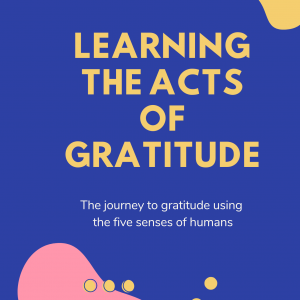What do you say? And the child replies thank you. Gratitude is a virtue we are taught from our earliest years.
Gratitude is learning or acknowledging the things we have received and being thankful for them. They may be little, mundane or significant things.
In (Psalm 100:4) it reads
Enter into His gates with thanksgiving,
And into His courts with praise.
Be thankful to Him, and bless His name.
If we are to be thankful, what are the things we can be grateful for ? Especially in the times and seasons of pressure. They may not seem obvious when our focus and mental recitation is on the things we are yet to have. When it seems blurry to see what we have, we need to reset our minds.
Now cast your mind to everything that you possess now that keeps you from being in your “birthday suit”. Those are the things you have. They are sometimes tangible and others are intangible things. Be thankful for them.
This virtue of gratitude is not acquired by going to school or reading a book. It is acquired by giving thanks. It is noticing the little things around you, or the things you classify as mundane or normal life.
What is normal for you? In 2020, the world has experienced a new normal. What are the repeatable actions you carry out every day? Remember the normal you are discontent with, it’s another person’s aspiration.
The forming of the attitude of gratitude is to pause and see things to be thankful for. People find different times of the day to reflect. If you are a morning person like me, my reflection time is early in the morning before the business of the day starts. And if you are a night owl, then that might be the best time to reflect. And even anytime in between.
A way to practice gratitude is to use your senses. Humans have sight, hearing, smell, taste and touch senses. Notice the things you see. Whether it is with your natural eyes, contact lens or a pair of reading glasses, when you wake up and look outside the windows what do you see?
This is what I see…
The tree in the garden, I notice the colour of the leaves as it tells the season of the year (the sense of sight). With that comes the chipping sound of the robin bird (the sense of hearing). I normally hear the sound of the bird before seeing the bird with its bright orange-red breast and brown coloured feathers.
The smell of the coffee kicks my brain awake (the sense of smell) well before its bitter and
sweet taste of it awakens my (sense of taste). I wrap my hands around the coffee mug on a cold morning to feel the heat (the sense of touch).
Now it’s your turn to use your senses to identify things you can be thankful for. While it may seem rehearsed at first it will become second nature if you persist at it.
Another thing that can keep aflame the gratitude attitude is writing down the things we are grateful for.
Some time ago, I had a talk with about 200 primary school pupils, and the challenge was to have a gratitude box from an old shoebox. We were to write three things we were grateful for at the end of each day for a month. The end of the month was a time to reflect on all the
lovely things that happened.
Let’s count our blessings and name them one by one. Even in a year as unprecedented as the year 2020. Take each past month and pen down at least 3 things you are grateful for. And it will surprise what the Lord has done for you this year.
Being thankful breeds our contentment. It makes our lives richer by counting the things we have, taking our focus from the things we do not have.
Remain blessed and grateful
If you are interested, we offer a gratitude journal both digital and paperback copies on the books section at www.inspirecan.com
Let’s count our blessings and name them one by one

